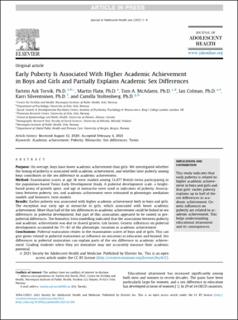| dc.contributor.author | Torvik, Fartein Ask | |
| dc.contributor.author | Flatø, Martin | |
| dc.contributor.author | McAdams, Tom A. | |
| dc.contributor.author | Colman, Ian | |
| dc.contributor.author | Silventoinen, Karri | |
| dc.contributor.author | Stoltenberg, Camilla | |
| dc.date.accessioned | 2021-08-09T12:40:26Z | |
| dc.date.available | 2021-08-09T12:40:26Z | |
| dc.date.created | 2021-04-15T13:20:08Z | |
| dc.date.issued | 2021-03-29 | |
| dc.identifier.issn | 1054-139X | |
| dc.identifier.uri | https://hdl.handle.net/11250/2767038 | |
| dc.description.abstract | Purpose
On average, boys have lower academic achievement than girls. We investigated whether the timing of puberty is associated with academic achievement, and whether later puberty among boys contributes to the sex difference in academic achievement.
Method
Examination scores at age 16 were studied among 13,477 British twins participating in the population-based Twins Early Development Study. A pubertal development scale, a height-based proxy of growth spurt, and age at menarche were used as indicators of puberty. Associations between puberty, sex, and academic achievement were estimated in phenotypic mediation models and biometric twin models.
Results
Earlier puberty was associated with higher academic achievement both in boys and girls. The exception was early age at menarche in girls, which associated with lower academic achievement. More than half of the sex differences in academic achievement could be linked to sex differences in pubertal development, but part of this association appeared to be rooted in prepubertal differences. The biometric twin modelling indicated that the association between puberty and academic achievement was due to shared genetic risk factors. Genetic influences on pubertal development accounted for 7%–8% of the phenotypic variation in academic achievement.
Conclusions
Pubertal maturation relates to the examination scores of boys and of girls. This can give genes related to pubertal maturation an influence on outcomes in education and beyond. Sex differences in pubertal maturation can explain parts of the sex difference in academic achievement. Grading students when they are immature may not accurately measure their academic potential. | en_US |
| dc.language.iso | eng | en_US |
| dc.publisher | Elsevier | en_US |
| dc.rights | Navngivelse 4.0 Internasjonal | * |
| dc.rights.uri | http://creativecommons.org/licenses/by/4.0/deed.no | * |
| dc.title | Early Puberty Is Associated With Higher Academic Achievement in Boys and Girls and Partially Explains Academic Sex Differences | en_US |
| dc.type | Journal article | en_US |
| dc.type | Peer reviewed | en_US |
| dc.description.version | publishedVersion | en_US |
| dc.rights.holder | Copyright 2021 Society for Adolescent Health and Medicine | en_US |
| cristin.ispublished | false | |
| cristin.fulltext | original | |
| cristin.qualitycode | 1 | |
| dc.identifier.doi | 10.1016/j.jadohealth.2021.02.001 | |
| dc.identifier.cristin | 1904294 | |
| dc.source.journal | Journal of Adolescent Health | en_US |
| dc.source.pagenumber | 1-8 | en_US |
| dc.relation.project | EC/FP7/602768 | en_US |
| dc.relation.project | Norges forskningsråd: 273659 | en_US |
| dc.relation.project | Norges forskningsråd: 300668 | en_US |
| dc.relation.project | Norges forskningsråd: 283603 | en_US |
| dc.relation.project | Norges forskningsråd: 262700 | en_US |
| dc.identifier.citation | Journal of Adolescent Health. 2021, 1-8. | en_US |

